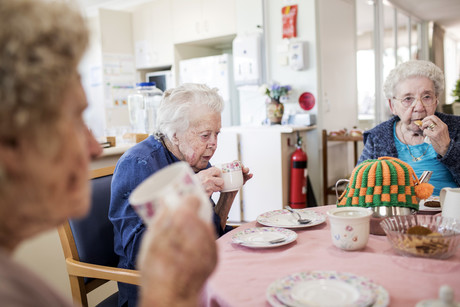Dementia Matters — rethinking the food model for people living with dementia

Lainie Lynch is improving the nutritional profile of people living with dementia through a food service model based on the internationally awarded Butterfly Household Care Model, pioneered by Dr David Sheard, founder of Dementia Care Matters in the UK.
The Butterfly Household Care Model is an intricate element of The Salvation Army Aged Care Plus’ Making Moments Matter care philosophy and was introduced in July 2016 to two Aged Care Plus centres in Narrabundah, ACT, and Chapel Hill, Qld. Physical, cultural and environmental changes have been implemented in line with the model throughout the memory support units at both centres.
Since the model’s commencement there has been a dramatic reduction in expressive behaviours amongst residents including verbal and physical aggression, agitation, wandering, isolation and confusion. There has also been a significant reduction in pain, falls and the requirement for psychotropic medication amongst residents.
The model’s overarching philosophy is one of providing person-centred care as opposed to task-based care. It requires staff to be empathic towards the emotional experience of residents living with dementia and they receive extensive training in person-centred care delivery.
Lainie is heading up the food delivery aspect of the model, which she says is seeing a significant improvement in residents’ overall health, BMI and enjoyment of the mealtime experience. Lainie explains how the new model is transforming residents’ mealtime experience.
“In our centres we have identified and removed any aspect of the environment with a clinical appearance. For example, our staff wear casual day clothes instead of uniforms and all our rooms are decorated with vibrant colours. While the use of colour creates a less clinical aesthetic, it also allows greater independence for those with sight spectrum declines and helps to reduce falls and enables easier navigation.
“Our foodservice environment reflects a family setting where staff share meals with the residents. Instead of plating all meals, we bring food in large serving bowls to the table so residents can help themselves and staff are there to assist and talk to the residents about the food.
“We encourage our residents to be involved in the preparation of meals including setting tables and we provide access to cooking utensils, bowls, aprons and all styles of kitchen paraphernalia. Bread machines are preset to have a fresh loaf ready each morning of the week. The focus is on stimulating all the senses and memories connected with the love of cooking and the enjoyment of food.
“Residents have access to meals and snacks at all times from a well-stocked kitchen so healthy food is available 24 hours a day. To enhance our residents’ nutritional intake we provide a choice of two proteins with each meal. Meals are served in a small domestic-style buffet on the table or kitchen benches in warmers. This allows the meal service to run for up to two hours and is especially helpful for breakfast when residents may wish to sleep in.”
Lainie and her team are constantly testing and updating recipes to ensure the menu plans contain meals of high nutritional value that residents will look forward to.
“I am developing new recipes all the time to enhance the nutritional intake of our residents,” Lainie said. “Before I test a recipe I run it through the Foodworks application that provides a nutritional panel for all the ingredients.
“It is essential to provide meals that are home-like and tasty and suitable for the generation that we are feeding.
“I feel this is missing in many aged-care food models. These residents are coming from an era of shepherd’s pie and braised steak — these are the foods they are used to eating. It’s important not to forget who we are looking after.
“Every three months my area managers and or I meet with the food focus groups across our 16 residential aged-care centres. We discuss the menu that is in place at each home and design a 5 week-2 choice menu cycle based on resident feedback. For instance, in the last meeting people were asking for beef and kidney pie as the weather is cooler.
“We don’t make assumptions about what our residents are going to want to eat. We talk to them to find out and sometimes the answers we get back are surprising. The residents at one of our regional centres in central NSW, traditionally meat and three vegetable country, enjoy a wide variety of pasta dishes.
Lainie feels Aged Care Plus’ dementia care philosophy, Making Moments Matter, is proving successful and is being embraced by residents family and staff.
“We have found that since implementing the dementia philosophy, our residents are eating more food, more regularly, and this is hugely significant when malnutrition is such a concern amongst those living with dementia,” she said.
“Seeing our residents enjoying their food and anticipating the next meal is enormously satisfying. The clinical outcomes we are seeing from Making Moments Matter is very positive, but for me to have a resident say to me ‘I can’t wait to have my lentil biscuit at morning tea instead of supplements’, is the strongest indicator that we are on the right track,” Lainie concluded.
Remote laundries target preventable disease in NT communities
A new community laundry has launched in Borroloola, part of a program seeking to curb preventable...
Eye care partnership looks to support First Nations optometrists
A new scholarship initiative will support Aboriginal and/or Torres Strait Islander optometrists...
A Day in the Life of a mobile optometrist
Linda Nguyen is the owner and founder of mobile optometrist practice Care Optometry and was a...




![[New Zealand] Transform from Security Awareness to a Security Culture: A Vital Shift for SMB Healthcare — Webinar](https://d1v1e13ebw3o15.cloudfront.net/data/89856/wfmedia_thumb/..jpg)
![[Australia] Transform from Security Awareness to a Security Culture: A Vital Shift for SMB Healthcare — Webinar](https://d1v1e13ebw3o15.cloudfront.net/data/89855/wfmedia_thumb/..jpg)




